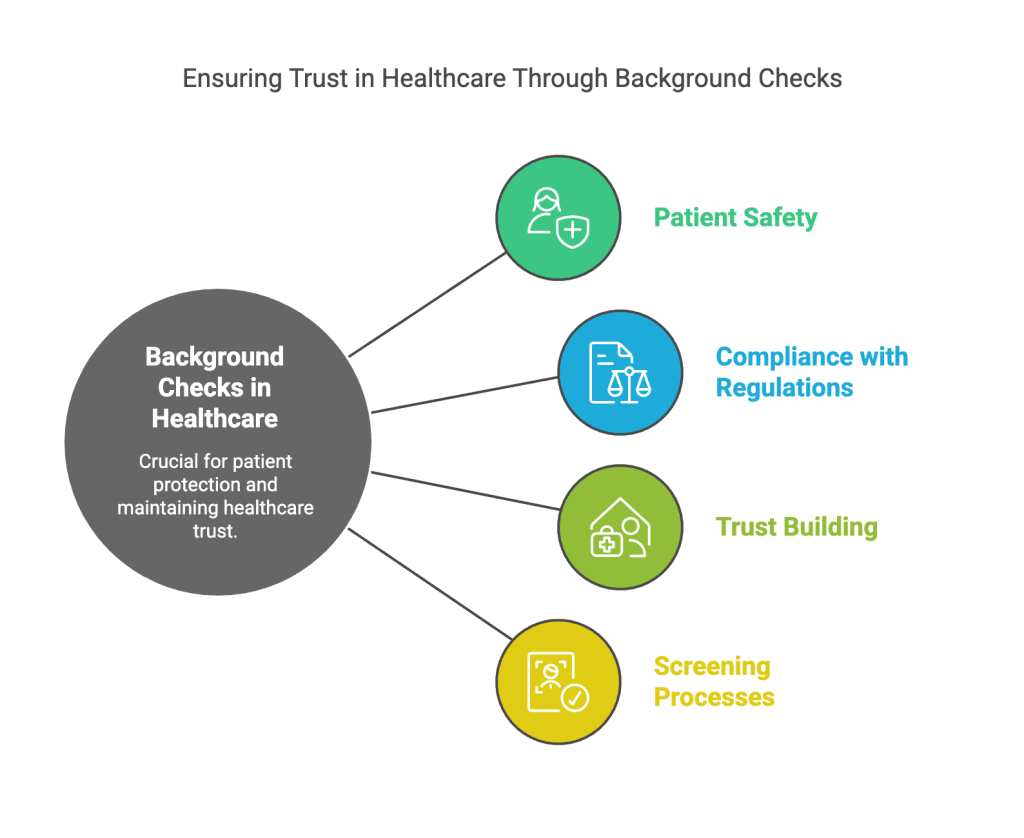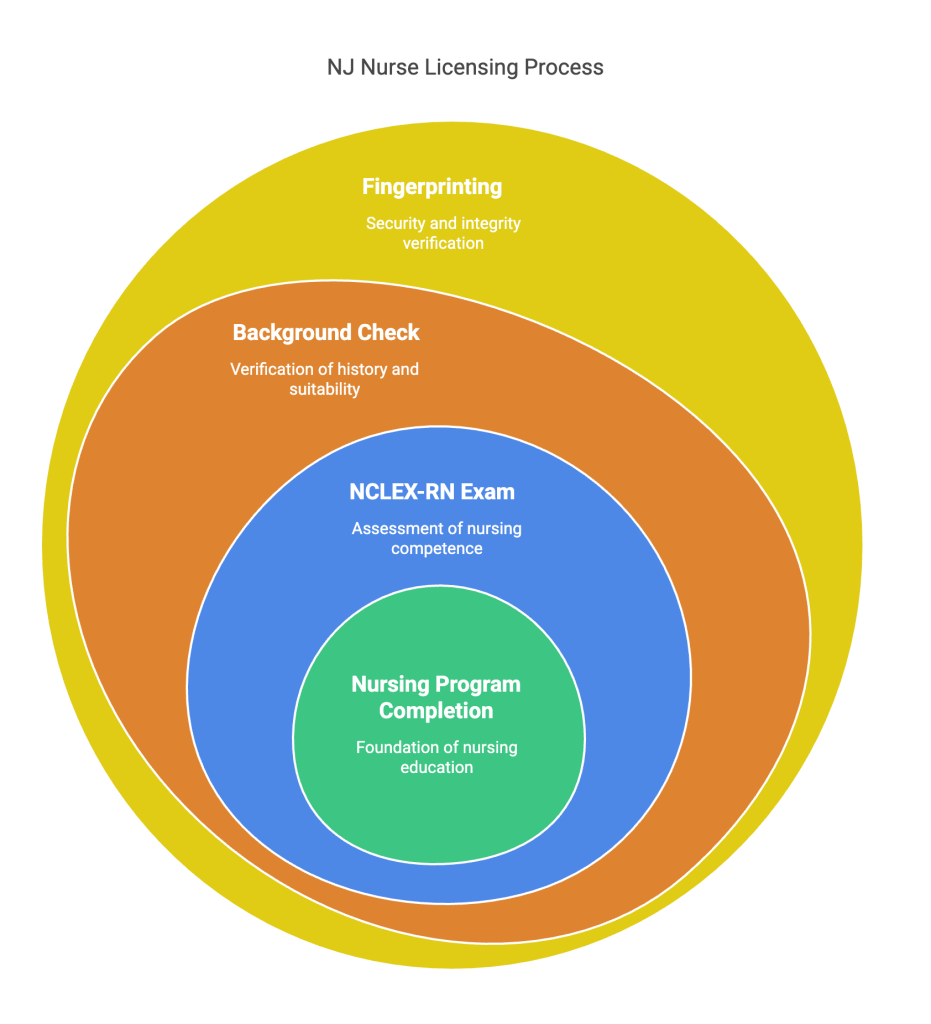In New Jersey, the healthcare field is one of high stakes and even higher trust. For nurses and caregivers who dedicate their lives to serving others, the process of getting licensed is rigorous and involves more than just academic qualifications. One critical aspect of this is the comprehensive background check. Whether youâre an aspiring nurse, a caregiver eyeing a rewarding career, or an employer navigating the complex hiring terrain, understanding New Jersey healthcare background checks is crucial.
This guide explores the background check process, licensing requirements for healthcare professionals, and potential disqualifications. We aim to demystify the process, reduce your anxiety, and help you navigate the system with confidence.
Key Takeaways
- Trust is central to healthcare, and comprehensive background checks in New Jersey help maintain this trust.
- Background checks in healthcare protect patients by ensuring that professionals have no dangerous histories.
- New Jersey's legal framework mandates both primary and secondary background checks for healthcare workers.
- For nurses, completing a program, passing the NCLEX-RN exam, and undergoing a thorough background check, including fingerprinting, are essential.
- Employers must conduct detailed background checks and adhere to legal requirements to ensure safe and ethical hiring practices in healthcare.
Introduction
Trust forms the backbone of the healthcare profession. When you step into a doctor's office or a care facility, there's an implicit faith in the competence and reliability of the staff. You want to know that the person caring for you has been thoroughly vetted and is qualified to provide the best possible care.
In New Jersey, healthcare background checks play a critical role in maintaining this trust. They go beyond cursory checks and dive into detailed examinations of one's history to ensure the safety and well-being of patients. This guide will help you understand the essentials of these background checks, specifically for nurses and caregivers. By familiarizing yourself with the procedures and requirements, you'll be better equipped to navigate the complexities of licensing and hiring within this vital field. Let's break down what you need to know to ensure that your journey into healthcare, whether as a professional or an employer, is securely rooted in trust and transparency.
The Importance of Background Checks in Healthcare
Background checks are more than a formality in healthcare; they're a crucial part of protecting patients and maintaining trust. When you enter a hospital or a care facility, you expect that the professionals responsible for your well-being have been thoroughly vetted. This isn't just about ensuring competence; it's about creating a safe environment where trust can flourish between caregivers and those they serve.
Every potential hire in healthcare undergoes a background check to identify previous criminal activity or conduct that could pose a risk. Imagine a nurse managing your medication or a caregiver working with vulnerable individuals. Without these checks, the consequences of overlooking someone's past could be severe.

State and federal regulations outline what's required for these checks. The Joint Commission, for example, mandates that healthcare organizations conduct extensive screenings before hiring. These screenings cover everything from verifying past employment to checking for any criminal history. You'll find that these regulations serve as a foundation for ensuring that only those with the right background are allowed to serve in healthcare roles.
There's also the matter of compliance. The laws governing healthcare background checks serve two primary purposes: they protect patients and describe what constitutes a suitable candidate. This means that as someone looking to work in healthcare in New Jersey, you'll need to go through a detailed evaluation process. This might seem stringent, but it's necessary in order to uphold the integrity and safety of healthcare services.
One resource you can reference for more insights is the Department of Labor, which offers guidance on hiring practices and requirements. By keeping these things in mind, you'll understand that background checks aren't just red tape; they're essential in upholding the trust and security of the healthcare system.
Understanding New Jersey Healthcare Background Checks
In New Jersey, healthcare background checks are governed by a robust legal framework. This system is designed to protect patients and ensure that only qualified, reliable individuals work in healthcare roles. New Jersey law mandates comprehensive checks for all healthcare professionals. This includes criminal history, abuse or neglect records, and professional license verification. Understanding these legal requirements is essential for both job seekers and employers.
There's a distinction between primary and secondary checks. Primary checks are the basic requirements, like verifying past employment and educational qualifications. Secondary checks delve deeper, examining any criminal records or disciplinary actions. These secondary checks often involve fingerprinting and are necessary to meet state and federal standards.
If you're entering the healthcare field, knowing the specifics of these checks can help you prepare better. It also benefits employers striving to maintain a trustworthy workforce. When everyone knows their role in the process, it upholds the integrity and safety of the healthcare environment. How prepared are you to meet these challenges head-on?
NJ Nurse Licensing Procedures
Securing a nursing license in New Jersey involves a detailed process beyond just meeting educational prerequisites. First, you need to complete a nursing program approved by the New Jersey Board of Nursing. This is foundational, as it ensures you have the academic grounding needed for the profession. Additionally, passing the NCLEX-RN exam is a must. It evaluates your competence in performing entry-level nursing duties.
But beyond academics, your background is scrutinized. This includes a thorough background check. The check encompasses several components: verification of your education, review of any criminal history, and assessment of your past employment. Each element plays a crucial role in painting a complete picture of your suitability for the role.

The role of fingerprinting is pivotal. In New Jersey, fingerprinting is mandatory for all nursing applicants. It forms part of the criminal background check, allowing the state to cross-reference with federal and state criminal databases. This step is non-negotiable and helps maintain the integrity and trustworthiness of healthcare professionals in the state. It ensures patient safety and upholds the healthcare system's standards.
So, if you're stepping into nursing, it's not just about passing exams. It's about presenting a comprehensive profile that meets all the regulatory requirements of New Jersey.
Caregiver Background Checks and Potential Disqualifications
You play a crucial role as a caregiver, ensuring the well-being of those you support. But before you step into this role in New Jersey, a thorough background check awaits. This process isn't just a formality; it's essential for the safety of both caregivers and those in their care.
A key element of the background check involves looking at your criminal history. In New Jersey, certain offenses can disqualify you from being a caregiver. These are typically serious violations, like violent crimes or sexual offenses. However, less severe offenses may weigh against you depending on recency and relevance. Always be upfront about any past legal issues. Preparing explanations for questionable areas can sometimes make a difference in decisions.
Another component often reviewed is your past employment and any incidents reported during those times. Employers dig into past work to check for any reports of abuse or neglect. References from previous employers can play a big role here.
New Jersey also considers abuse reports seriously. If youâve ever been involved in a substantiated case of elder or child abuse, this can lead to disqualification. The state's task is to protect those who canât protect themselves, and past abuse is a red flag.
Ultimately, thorough checks protect everyone involved. They ensure that caregivers are trusted individuals ready to provide the care and compassion required. Understand these disqualifications, not as barriers, but as part of striving toward a system that values and ensures safety and trust.
Navigating NJ Fingerprinting Requirements
Fingerprinting is a pivotal step in New Jersey's healthcare background checks for nurses and caregivers. Here's a clear guide to help you navigate this process with ease.
Fingerprinting Process:
- Registration: Start by registering online through the New Jersey Division of Consumer Affairs website. This connects you to the official fingerprinting service provider, usually IdentoGO. You'll need to fill out your personal information and select a fingerprinting location.
- Appointment Scheduling: After registration, schedule an appointment at a convenient location. It's wise to book a slot well in advance, as availability can vary, especially in high-demand periods.
- What to Bring: On the day of your appointment, ensure you have a valid ID (like a driver's license or passport) and the registration confirmation. Forgetting these can delay your process.
- The Fingerprint Session: At the appointment, a technician will scan your fingerprints digitally. This is quick and painless. Make sure your hands are clean and dry for the best results.
- Submission and Waiting: Once your fingerprints are taken, they're submitted electronically. Processing times can vary, but you should expect to hear back in a couple of weeks.
Common Pitfalls
- Missed Appointments: Avoid missing your appointment by setting reminders. Missed slots can significantly delay the licensing process.
- Incorrect Information: Double-check your registration details. Errors in forms can lead to rejection or the need to redo your fingerprints.
- Procrastination: Procrastinating on setting your appointment can hinder your licensing timeline. Prioritize this to keep things moving smoothly.
Being aware of these potential pitfalls can save time and frustration. Taking these proactive steps ensures a smooth fingerprinting experience as you progress in your healthcare career.
Preparing for Your Healthcare Background Check
Getting ready for a healthcare background check in New Jersey doesn't have to be overwhelming. The right preparation can make the process smoother and more efficient. Start by gathering the necessary documents. This typically includes your government-issued ID, social security number, education transcripts, and previous employment records. Having these ready will save you significant time and effort.
Next, identify any potential red flags in your history. If you have a criminal record or any gaps in employment, be prepared to address these. Transparency is crucial. Consider writing a clear, honest explanation for each issue. Employers value candor and a willingness to be upfront about past challenges.
If you're uncertain about handling these situations, seeking legal advice can be beneficial. A legal professional can offer guidance on how to best present your case and possibly mitigate concerns.
Lastly, take advantage of any support systems available to you. Whether it's a legal expert, mentor, or professional network, utilizing these resources can provide valuable insights and help you stay informed throughout the process. Preparing thoroughly not only meets requirements but also demonstrates your dedication to entering the healthcare field responsibly.
The Role of Employers in Ensuring Safe Hiring
You play a crucial role in maintaining safety and trust within your healthcare organization. Conducting thorough background checks isn't just a legal obligation; it's a commitment to quality care and patient safety. Your responsibilities in this process are significant.
Making sure your hiring practices comply with state laws is fundamental. New Jersey mandates specific checks for healthcare professionals, including criminal background investigations funded through the New Jersey Fingerprint-Based Criminal History Background Check. It's your job to ensure these checks are completed accurately and documented properly.
Itâs not all about checking boxes. You should also emphasize ethical hiring practices. Building trust with both employees and patients begins with transparency. Inform candidates about the steps involved in their background checks. Ensure their privacy and rights are respected throughout the process. This builds a foundation of confidence and mutual respect.
You canât do this alone. Utilize your organization's internal resources. Tools like the internal blog can offer valuable insights to streamline your background check procedures. Regular training and updates for your HR team are also important. Staying informed about changes in legislation and practices can save you from non-compliance issues and enhance your hiring process.
Taking these steps not only safeguards your patients but also improves your reputation as a trustworthy healthcare provider. Being diligent in this aspect reinforces your facility's commitment to safe and ethical healthcare service delivery.
Conclusion
Navigating New Jersey's healthcare background check process may seem daunting at first, but you've got the tools you need to succeed. It all starts by understanding the foundational steps of this process. Every piece of information gathered through background checks, from fingerprinting to employment history, plays a part in ensuring the safety and trust required in healthcare environments.
This guide breaks down each step, providing clarity on how to effectively manage your background check and licensing requirements. Whether you're an aspiring nurse or a caregiver, being prepared involves more than understanding qualificationsâit's about compiling necessary documents, understanding potential disqualifications, and knowing when to seek legal advice.
The key takeaway here is that thorough preparation can simplify the path to your desired career in healthcare. By addressing potential red flags proactively and adhering to state regulations, you'll position yourself for success. Remember, every step you take brings you closer to a career dedicated to improving lives. Stay engaged, ask questions, and make sure you meet all the requirements with diligence and care. Your dedication to this process reflects your commitment to healthcare professionalism and trust.
Frequently Asked Questions (FAQs)
What crimes disqualify healthcare workers in NJ?
In New Jersey, healthcare workers may be disqualified from employment if they have convictions for serious offenses such as violent crimes, sexual offenses, drug-related offenses, and theft or fraud. These are considered serious breaches of trust and safety.
How long do NJ nursing background checks take?
Background checks for nursing in New Jersey typically take two to four weeks. This time frame can vary based on the completeness of records and the workload of the processing agency.
Can a DUI affect a nursing license in NJ?
Yes, a DUI can impact your nursing license in New Jersey. The state board evaluates the circumstances surrounding the DUI, its severity, and any recurring issues before deciding on licensure.
Are expunged records visible to NJ medical boards?
Expunged records are generally not visible to New Jersey medical boards. However, certain law enforcement and government agencies may have access to these records under specific circumstances.
How to appeal a denied healthcare license in NJ?
To appeal a denied healthcare license, you must file a request with the relevant board or agency for a hearing. Ensure you have all necessary documentation ready to support your appeal.
Do NJ hospitals require FBI fingerprinting?
Yes, many New Jersey hospitals require FBI fingerprinting for prospective employees to ensure thorough background checks.
Does NJ accept out-of-state healthcare checks?
New Jersey does accept out-of-state background checks, but they must meet state standards and sometimes require additional documentation or verification.
Whatâs the cost of NJ healthcare background checks?
The cost of healthcare background checks in New Jersey varies but generally ranges from $50 to $100. Fees depend on the depth and type of the check required.
Are NJ temp agency healthcare workers screened?
Yes, temporary healthcare workers through agencies in New Jersey are screened to meet state compliance and safety standards.
Can you work in healthcare with a misdemeanor in NJ?
Working in healthcare with a misdemeanor in New Jersey is possible, depending on the nature and date of the offense. Each case is evaluated individually.
How does NJ handle background checks for international healthcare professionals?
New Jersey requires international healthcare professionals to undergo background checks equivalent to state standards, often involving cooperation with international agencies.
Is ongoing background screening required for NJ healthcare workers?
Yes, ongoing background screening is often mandated to ensure continuous compliance with state regulations for the safety of patients.
What information is included in an NJ healthcare background check?
An NJ healthcare background check typically includes criminal history, employment verification, education verification, and sometimes credit checks.
How does NJ protect personal information during background checks?
New Jersey follows strict privacy laws to protect personal information collected during background checks, ensuring it is used only for intended purposes and kept confidential.
Definitions
Background Check
A background check is a review of a personâs criminal record, employment history, education, and other relevant information. In healthcare hiring, this helps determine if someone is qualified and safe to work in roles involving patient care. For example, a nurse applying for a position may need to pass a fingerprint-based criminal check and show verified past employment.
Fingerprinting
Fingerprinting involves scanning a personâs fingerprints to check against law enforcement databases. This method helps detect any criminal history tied to an individual. In New Jersey, fingerprinting is mandatory for nurses and caregivers as part of their licensing process. It adds a layer of security and ensures legal compliance.
Licensing
Licensing is the official approval to work in a specific profession, usually granted by a state board or regulatory agency. For nurses and caregivers in New Jersey, this includes meeting educational requirements, passing exams like the NCLEX, and completing background checks. Without a valid license, you can't legally practice in these roles.
Employment Verification
Employment verification confirms a person's past job roles, duration, and performance. Employers contact previous workplaces to validate claims on a resume. In healthcare, this step checks for concerns such as unexplained job gaps or past misconduct. Accurate records help build a trusted workforce.
Disqualification
Disqualification means being deemed ineligible for a job or license due to specific issues in your background. In healthcare, this often results from serious offenses like abuse or violent crimes. However, minor issues might not lead to disqualification if explained properly. Understanding what could cause disqualification helps you prepare and respond effectively.

GCheck Editorial Team
Meet the GCheck Editorial Team, your trusted source for insightful and up-to-date information in the world of employment background checks. Committed to delivering the latest trends, best practices, and industry insights, our team is dedicated to keeping you informed.
With a passion for ensuring accuracy, compliance, and efficiency in background screening, we are your go-to experts in the field. Stay tuned for our comprehensive articles, guides, and analysis, designed to empower businesses and individuals with the knowledge they need to make informed decisions.
At GCheck, we're here to guide you through the complexities of background checks, every step of the way.






